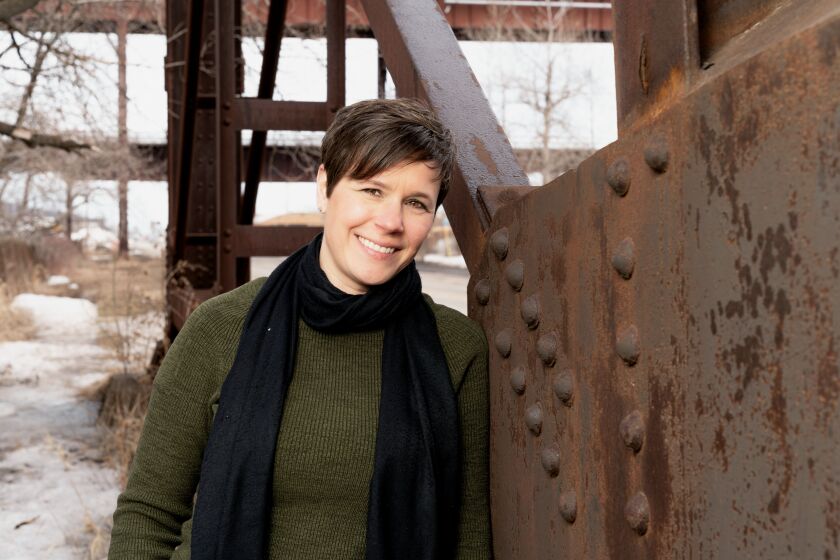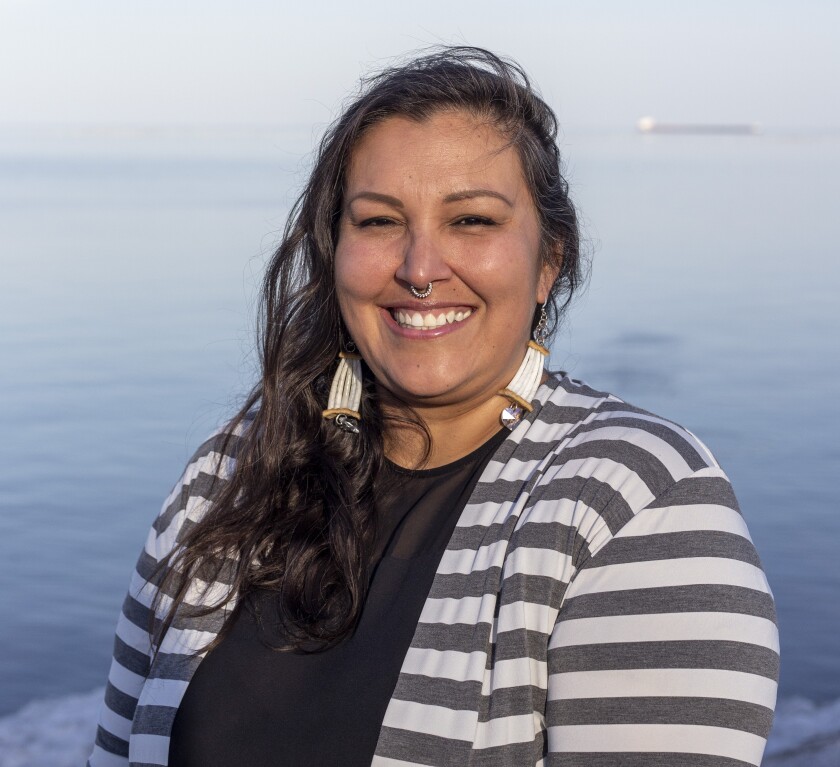
DULUTH — Four candidates are vying for two at large seats on the City Council next year, including incumbent Arik Forsman and three newcomers: Lynn Marie Nephew, Miranda Pacheco and Jenna Yeakle.
The field includes a convicted felon-turned-addiction counselor, a Realtor, a community organizer and an economic development specialist.
The News Tribune sat down with each of these candidates to learn a bit more about their motivations to run and their experiences campaigning in advance of the Nov. 7 election.
Contributed / Lynnette’s Portrait Design
If elected, Forsman, who works on behalf of Minnesota Power to promote regional economic development, will rejoin the council as its most senior member, having served since 2018.
He believes that experience will enable him to effectively represent constituents from day one of the upcoming term and could provide valuable continuity at a time when six of nine seats on the council are up for grabs.
Initially, Forsman said he would not seek reelection, but reversed course after a number of colleagues and constituents expressed disappointment with that decision and asked him to reconsider. He says he’s glad he did, adding that his desire to serve has not wavered.
Forsman believes he brings useful financial acumen and an ability to collaborate with people of all persuasions to his office. He also grasps the importance of not sitting still as a community.
“For me, economic development means you’re able to grow your tax base and fund priorities and hopefully elevate people’s lives at the same time through higher-wage opportunities,” Forsman said.
But Forsman said the city is quite limited in its own financial capacities and often needs state and federal support to make substantial progress.
“All we can do, to some degree, is set the table and to have our house in order and ready and prepared for when opportunities come forward where we can partner,” he said.
Forsman and his wife live in the Kenwood neighborhood with their two children, ages 5 and 8, and he has been a strong proponent of increasing the city’s supply of affordable child care.
While Forsman said he believes local governments are uniquely positioned to respond to the needs of residents, he remains skeptical of the city trying to aggressively intervene in the local marketplace.
For instance, Forsman said: “I think rent control is a terrible idea. I think it wouldn’t work in a city of our size, and any effort to copy and paste St. Paul’s ordinance would be a complete disaster for our housing market.”
He suggested such controls would lead property owners to convert rental housing to condos and likely would discourage new investment in needed rental units.
Likewise, he’s not a fan of setting a higher local minimum wage in Duluth.
“It’s tough to do at a local level for a city the size of Duluth. We’re not as big as other major metros that can sort of set the pace in terms of how those policies go,” Forsman said.
“I would rather focus on if someone’s lacking training or certifications to get to those $25-to-$30-an-hour jobs that exist in this community, how do we invest so those folks get to that level. I think that’s more transformative,” he said.

Nephew very much brings a Realtor’s eye to her view of local government and said it’s hard to overstate the importance of the city upping its housing supply, across the spectrum.
“Right now, the biggest challenge in Duluth is housing,” she said. “It’s an issue that is dampering public safety; it’s dampering local businesses’ ability to recruit; it’s stifling our economic development.”
Nephew said Duluth’s housing shortage intersects with numerous other local issues, often exacerbating them.
Nephew has 20 years in Duluth’s housing field. Prior to that, she worked in the court system with survivors of domestic violence.
“Public safety is something I do believe in, and I think public safety is something that has gotten unfair treatment in some respects over the past few years because I don’t believe all police departments and public safety departments are created equally. And in Duluth, we’re really unique in that we have a pretty progressive department,” she said.
“I think Duluth is at a moment where we have a great opportunity to thrive to a different degree than we have in many, many years,” Nephew said. “The climate refugee phenomenon is a real thing. I see it in my business. And if we don’t acknowledge that and start getting more units out there and online, we’re going to be behind the eight ball, and I think homelessness and housing challenges are just become an even bigger problem than we’re experiencing now in the next five years.”
Nephew said she’s been asked in the past to run for council but responded to that call for the first time this year.
“I think I’m at a place in my life now where I have time. My kids are a little older,” she said. Nephew and her husband live in the Congdon neighborhood and are the parents of four children: a seventh grader, a 10th grader, an 18-year-old and a 20-year-old.
“Selfishly, I’d like to see more units online and for this to grow into a vibrant place, so that my kids can come back here when they’re finished with school,” Nephew said.
She said the process of bringing development projects forward in Duluth and getting the proper permits has long been a challenge.
“I think our city employees are amazing, and they do really great work, but I think it’s the process that needs to be cleaned up,” Nephew said.
“So, we need to go back and figure out how to make the process smoother so builders don’t need to sit there and run circles in order to get their plans approved,” she said, noting that delays often equate to rising project cuts.

Pacheco is savoring this year, as the Minnesota Legislature not only restored her right to vote as a convicted felon now on parole, but also opened the door for her to be a candidate.
“It took a lot of asking myself, ‘Why do you want to run for elected office?’ Well, I want to serve the public, and I want to see change,” she said.
“I want lived experience at the table, because our city has so many problems right now with housing and with mental health and with substance abuse, and I have personal experience with all of that. I think my voice will be valuable at City Hall, because we can’t figure out a problem without people like me. I’m closer to the problem and so I’m closer to a solution,” Pacheco said.
Pacheco, a member of the Leech Lake Band of Ojibwe, moved to Duluth in 2015 as a 35-year-old without a home, seeking treatment for addiction and having lost custody of her two children.
Here, she reconnected with her Indigenous heritage and credits those traditions for her successful recovery. Pacheco regained custody of her children, now ages 22, 17 and 14, and also achieved the dream of homeownership, as a resident of West Duluth.
Improving the city’s supply of affordable housing is one of Pacheco’s top priorities.
“Nobody deserves to be homeless, and I know how that feels,” she said. “It’s dehumanizing and degrading.”
Pacheco said many other residents also are experiencing housing instability, as they increasingly feel priced out of their homes by taxes and inflation.
Pacheco went on to study at Fond du Lac Tribal and Community College, as well as the College of St. Scholastica, where she expects to graduate in May. Today, she works as a counselor helping others overcome alcohol and drug addiction.
“It deepened my motivation to help people and serve the public. I believe that people deserve better, and if there were not people who fought for me during my journey, I don’t know if I would have made it. So, I know how much of an impact that made for me,” she said.
Pacheco said she also remains committed to improving Duluth’s street and sidewalk system, noting that her car required expensive repairs after sustaining pothole damage this spring, and she recently took a spill on an uneven sidewalk, resulting in a bloody knee while door knocking for her campaign.
“I’m like, ‘Yo, we just want to get around safely,” Pacheco said.
She views 2023 as a watershed year for many previously disenfranchised citizens, such as herself.
“First they passed a law so that felons could vote. And now, felons can vote for someone who looks like them, too, someone they can relate to,” Pacheco said.
“Even if I don’t win the election, I hope to have cleared a path for others, so people in the future can step up and do this work,” she said.
“Never give up hope, because anything is possible.”

Yeakle believes her background has prepared her well for service, having earned a master’s degree in public health with a focus on community health promotion from the University of Minnesota, and also through her experience as a community organizer.
“Public health is about changing the conditions in which we live, to support good health and wellbeing for our community. The housing crisis that Duluth and so many cities across the nation are experiencing is a public health concern and can be addressed as a public health matter, especially when we are taking into account economic equity, racial justice and social determinants. Housing is such a huge determinant of health outcomes,” she said.
Yeakle, who lives in West Duluth with her fiance, said the city struggles with “very serious racial, economic and health disparities.”
She noted that the city’s poverty rate continues to run at about 20%. “That should be a cause for alarm for all of our elected officials,” Yeakle said.
“Many of us are struggling right now. Property taxes are too high. Rent is unaffordable. Folks are concerned about their neighbors experiencing homelessness. And our streets and our utilities desperately need attention,” she said.
Yeakle says there is a serious disconnect between what many Duluth residents are earning and what they need to get by. That’s why she believes the city should consider actions that might lift people out of financial hardship. Those types of policies include discussions about the possibility of rent control and a higher local minimum wage.
“I am very ready to explore what an annual limit on the increase in rent to the local measure of inflation could look like in Duluth,” she said. “I know that any rent stabilization policy is not a silver bullet. It would need to be thought through really carefully and would certainly deserve robust public engagement, especially with renters and those smaller landlords, plus locally owned smaller property management companies,” Yeakle said.
“But 40% of Duluthians rent. And if our goal is to house people, there is abundant evidence that this is a policy that has proven to help make that happen. So, I am at least ready to have a conversation about it,” she said.
By the same token, Yeakle remains open to the idea of adopting a higher local minimum wage than the rest of the state.
“When we’re talking about increasing the minimum wage, we’re also addressing the affordability of housing and child care, not only for those folks paying for child care but also, the number one reason why child care professionals leave is because of inadequate wages,” she says.
“One of the core reasons why I’m running for City Council is to ensure good public process in ordinance making and in legislating. That’s something that I’m really committed to is that any of these issues deserves such good consultation with not only our leaders, our nonprofits and other government officials, but also just other community members who are most impacted, Yeakle said.
